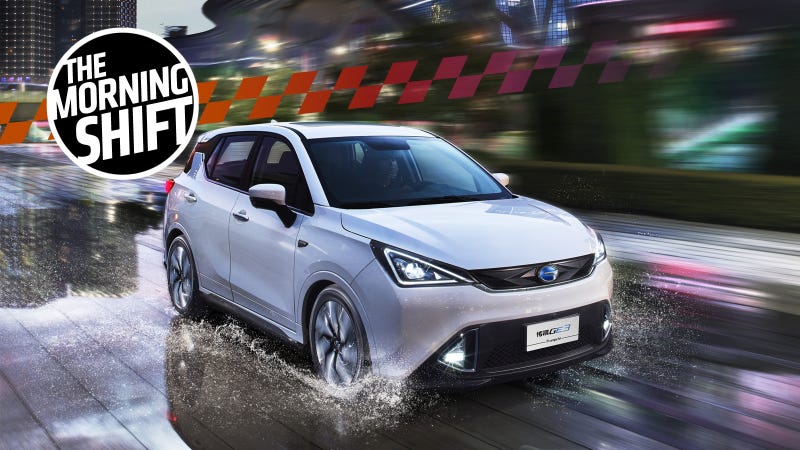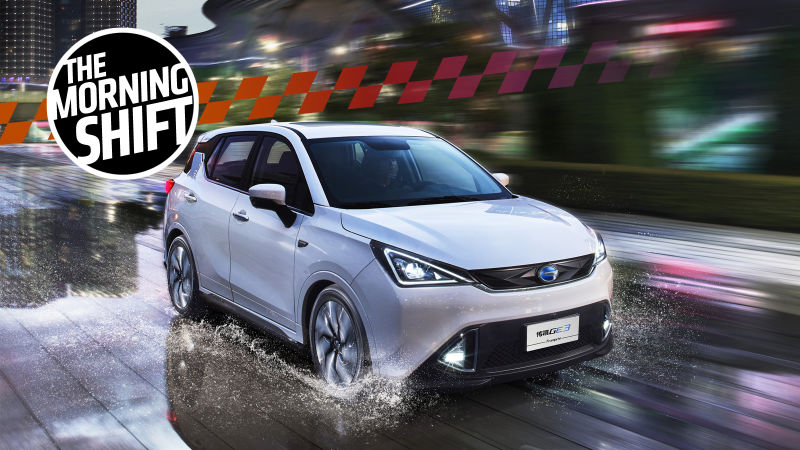
 The Morning ShiftAll your daily car news in one convenient place. Isn’t your time more important?
The Morning ShiftAll your daily car news in one convenient place. Isn’t your time more important? If America won’t get its shit together on EVs, maybe China will do it for us. That and more on The Morning Shift on Thursday, Nov. 15, 2018.
1st Gear: Here’s How China Is Doing It
Recently in the office we got asked what would be the most realistic way for the United States to switch off completely from internal-combustion engines and go all in on EVs. Maybe regulations at the federal level? The state level?
Nah, we all kind of agreed, the most likely way it’s going to happen is for China to go all in on EVs. The Chinese car market is about 1.7 times as big as ours the last I checked, and there’s going to be a point when global car companies are just going to give us a bunch of EVs because there’s not much else to offer.
And that’s not a completely unrealistic scenario, as China is indeed pushing way ahead on EVs. A nice article today from Bloomberg “China Is Giving the World’s Carmakers an Electric Ultimatum” lays that out:
Starting in January, all major manufacturers operating in China—from global giants Toyota Motor and General Motors to domestic players BYD and BAIC Motor—have to meet minimum requirements there for producing new- energy vehicles, or NEVs (plug-in hybrids, pure-battery electrics, and fuel-cell autos). A complex government equation requires that a sizable portion of their production or imports must be green in 2019, with escalating goals thereafter.
The regime resembles the cap-and-trade systems being deployed worldwide for carbon emissions: Carmakers that don’t meet the quota themselves can purchase credits from rivals that exceed it. But if they can’t buy enough credits, they face government fines or, in a worst-case scenario, having their assembly lines shut down.
Advertisement
Credits like this is how Tesla has made a good amount of money in the past, which is a nice reminder of how much the U.S. government could be doing just like China is right now. We’re just, you know, not.
What I find interesting is that China’s system doesn’t just allow for automakers to produce weak EV efforts and call it a day (as many of California’s regulated-into-existence “compliance cars” like the Chevy Spark EV have been). China’s credits scale down for how little performance a company offers:
The formula for doing so is algebraic, and the 10 percent credit target in the first year won’t necessarily equate to 10 percent of cars sold. For example, a pure-electric vehicle with a range topping 300 kilometers (186 miles) will generate more credits than one with lesser performance or than a gasoline- electric hybrid. The rules apply to all companies that manufacture or import more than 30,000 cars annually. The floor rises to 12 percent in 2020, then keeps increasing in line with the government’s ultimate plan to eliminate fossil fuel vehicles by a still-unspecified date.
Advertisement
You can tell that this EV push is indeed exerting real pressure, as Bloomberg notes, because of how carmakers are scrambling to meet its quotas. Bloomberg points to how Toyota, Fiat Chrysler Automobiles, Honda Motor, and Mitsubishi will soon all be selling the same car made by Chinese automaker GAC, which we reported on the other day.
Again, there’s nothing here that the U.S. couldn’t be doing. We’re just letting China take the lead.
Advertisement
2nd Gear: Beijing Actually Has to Cut Down on EV Production
This will be a slightly over-the-top assessment of things, but the push for EVs is so strong in China that in Beijing the government is launching a crackdown on EV production. The trick is that this is on unlicensed, low-speed EVs, as Automotive News China reports:
Provincial governments must shut down unlicensed local low-speed EV makers and stop them from producing at plants of licensed automakers, according to a notice released last week by the Ministry of Industry and Information Technology, the regulator of industries, including automobiles, in China.
[…]
Low-speed EVs mainly refer to short-range, electric three wheelers and cars equipped with technologically obsolete batteries and electric motors, the ministry said in the notice, without disclosing further specifications on the vehicles.
[…]
Low-speed EVs also pose severe safety risks to public safety, the ministry said. In the past five years, the vehicles were responsible for around 830,000 traffic accidents, which resulted in the death of about 18,000 people, according to the ministry’s tally.
Advertisement
I shouldn’t act like this is a totally foreign situation. Here in New York there have been lots of city drama about banning electric-assisted bicycles used for delivery around town, which isn’t completely different.
3rd Gear: Ford Still Needs “Billions” to Get Autonomous Cars Going
Yesterday we reported that Ford will be tying up with corporate giganto-hulk Walmart for developing autonomous vehicles. Seemed like a weird move.
Advertisement
And it’s one that makes a bit more sense in the context of a new announcement from Ford’s self-driving car unit that it still is in need of “billions of dollars” to get things going, as the Financial Times reports:
Ford’s self-driving car unit Argo AI is in talks with multiple rival carmakers, seeking “billions of dollars” to help fund the development of autonomous vehicles, says the division’s chief executive, Bryan Salesky.
“We are definitely talking to other potential customers, OEMs [carmakers], we are talking to more than one,” he told the Financial Times in an interview, as Ford laid out the range of its driverless ambitions at an event in Miami where it is testing self-driving cars in real world conditions.
He stopped short of confirming that one of the companies is Volkswagen.
Again, Ford and VW have been cozying up on EV development as of late. It’s interesting to see that the crunch on EVs and autonomous cars happening at the same time means that it’s not enough for one carmaker to partner with another. Myriad partnerships are needed. How this is all going to work out, I do not know.
Advertisement
4th Gear: Meanwhile Uber Posts $1 Billion Losses Ahead Of IPO
So that’s how things are going in the world of legacy carmakers getting into the space of tech companies. What about tech companies that exist in the automotive space? Oh. Ah.
Per The Guardian:
Uber has posted a loss of more than $1bn (£780m) in its latest quarter as growth in bookings continued to slow in the run-up to its stock market flotation next year.
The San Francisco-based ride-sharing firm, valued at $76bn, is under pressure to improve its financial performance before the IPO. It lost $1.07bn in the three months to September, a 20% increase from $891m in the previous quarter.
Advertisement
If you’re curious, Uber could go for a $120 billion valuation when it goes public, as The Guardian points out, which is three times the value of Ford.
5th Gear: Aston Profits Up Tenfold in What Must Be Healthy and Maintainable Growth
One of the stories I’ve been enjoying following is of Aston Martin going public. It’s been years since Aston got cut loose from Ford, and it’s sort of interesting to see how the little automaker is making things work in this world of increasingly tight partnerships.
Advertisement
And things seem to be going well, as Automotive News Europe reports. Very well:
Aston Martin’s quarterly profit before tax rose to 3.1 million pounds ($4 million), a tenfold increase as the newly listed automaker continues a growth plan which saw its sales volumes double in the three-month period.
Vehicles sales increased 99 percent to 1,776, helped by a 185 percent increase in the Americas and a 133 percent increase in Asia Pacific, leading to an 81 percent increase in revenue to 282 million pounds, the automaker said in a statement on Thursday.
Aston Martin last month became the first British automaker in decades to float on the London Stock Exchange. It said it expected full-year sales to come in at the top end of expectations at up to 6,400 vehicles.
Advertisement
And Aston has an SUV coming. Maybe it’s not impossible to be an independent car company in the 21st century.
Reverse: Good Car, Good Name
Advertisement
Neutral: What Would It Take to Get America to Match China’s EV Push?
There’s nothing structural keeping America from matching China’s EV pressure. What do you think would have to happen socially or politically to make it all work, though?













